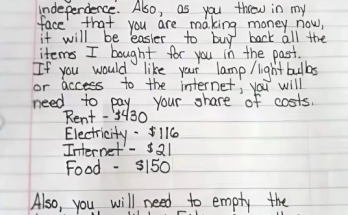Young Man Hospitalized After Dropping His Vape Cartridge: A Cautionary Tale of Reflex, Risk, and a Near-Tragedy
It was supposed to be a normal afternoon — a few minutes outside, a quick smoke break, and back to class. But for 19-year-old Elijah Torres, what began as a clumsy moment turned into a full-blown emergency. The incident, which occurred just outside a community college in suburban Houston, has since sparked both medical concern and online debate — not only about vaping, but about reflexes, pressure, and the split-second decisions that can change everything.
The Moment Everything Changed
Elijah had just finished a tutoring session and stepped outside to take a few drags from his vape pen. He was standing near the edge of a stairwell railing — a place where students often gathered to text, vape, or just decompress between classes. He removed his vape cartridge to refill it when, according to witnesses, it slipped from his fingers and began to tumble toward the ground two stories below.
Acting on pure instinct, Elijah lunged to catch it — not realizing just how close he was to the edge. In one terrifying moment, he lost his balance and plunged over the railing, crashing onto the concrete below.
Witnesses described a horrifying thud, followed by stunned silence. “It didn’t feel real,” said one student who saw it happen. “One second he was reaching, and the next he was just gone.”
A Chaotic Scene and a Race Against Time
Campus security and bystanders rushed to Elijah’s aid. He was conscious but in visible agony, his breathing shallow and face pale. Emergency responders arrived within minutes and transported him to Memorial Hermann Hospital with multiple injuries: a fractured pelvis, cracked ribs, and a concussion.
Doctors said the fact that he landed partially on his side likely prevented spinal damage or worse. “He’s lucky to be alive,” said trauma surgeon Dr. Eric Bain. “Falls from that height, especially onto concrete, are often fatal or result in permanent disability.”
Elijah’s parents were notified while he was undergoing emergency scans. His mother, Carmen Torres, later said through tears: “All because of a vape cartridge. He was trying to save something worth twenty dollars and almost lost everything.”
The Price of a Reflex
It wasn’t about addiction, recklessness, or showing off. Those who know Elijah describe him as cautious, respectful, and introverted — the kind of student who sits in the front row and walks his little sister home from school.
“He’s not some daredevil,” said close friend and classmate Kevin Long. “He was just trying to catch something he didn’t want to lose. It was an instinct. That’s what makes this so scary — it could happen to anyone.”
Experts agree. According to psychologists, reflex-based reactions, like catching a falling object, often override critical thinking in high-stress moments. “We’re hardwired to react quickly to dropping something, especially if we think it’s valuable,” said Dr. Fiona Marsh, a behavioral neuroscientist. “In some cases, those instincts can be dangerous, especially if we’re not aware of our surroundings.”
The Bigger Conversation Around Vaping Culture
The incident has triggered renewed scrutiny of vaping among young adults — not because the vape caused his injuries directly, but because of the increasingly casual relationship students have with these devices.
“I don’t think people realize how often students are carrying vapes around with them — in pockets, on lanyards, under desks,” said Professor Lena Hodge, who teaches health education at the college. “When something becomes that normalized, it can distort your perception of risk.”
Others are focusing on the culture of silence surrounding vaping. Elijah reportedly kept his usage quiet from his parents, and his professors had no idea he vaped at all. For many students, it’s seen as “harmless” or “just flavored air,” despite growing evidence about its health risks and social pressures.
“We’ve taught teens that vaping is better than smoking — and maybe it is,” Professor Hodge added. “But we haven’t taught them to treat it with respect. Devices can malfunction. They can get hot. They can fall. And as we see here, sometimes, the consequences go way beyond health.”
An Outpouring of Support and a Difficult Recovery Ahead
As news of Elijah’s fall spread, students and teachers rallied around him. A GoFundMe campaign to help cover medical expenses surpassed $20,000 in just three days. Dozens of classmates wrote messages of encouragement, many admitting they’d had their own close calls trying to retrieve dropped phones, earbuds, or vape pens.
“He doesn’t deserve this,” one post read. “He’s one of the kindest people on campus. If anything good comes of this, I hope we all just start thinking twice before we react.”
Elijah, still recovering in the hospital as of this writing, is expected to undergo physical therapy and may need surgery to address his pelvic fractures. Though doctors are optimistic about a full recovery, they caution that it could take months before he walks unassisted again — and even longer before he returns to the activities he once took for granted.
His mother says he’s devastated. “He keeps replaying it over and over — the moment he reached. He told me, ‘I just didn’t think. I didn’t want it to break or disappear. I didn’t want to look stupid.’ And that broke my heart.”
A Wake-Up Call for Everyone
In the wake of Elijah’s accident, the college is reviewing safety protocols for common areas, including installing higher railings and posting signs to discourage sitting or leaning too close to stairwell edges. But they’re also using this as a teaching moment.
Counselors and health educators are planning workshops on vaping awareness, reflex behavior, and impulse control. “It’s not about shaming students,” said Dean Marcus Wiley. “It’s about equipping them to pause — just long enough to ask, ‘Is this worth it?’”
As for Elijah, he’s now being called “the strongest guy we know” by his friends, even as he begins the painful road to recovery. His story is being shared in classrooms, dormitories, and across social media not just as a cautionary tale — but as a reminder of how fast everything can change.


